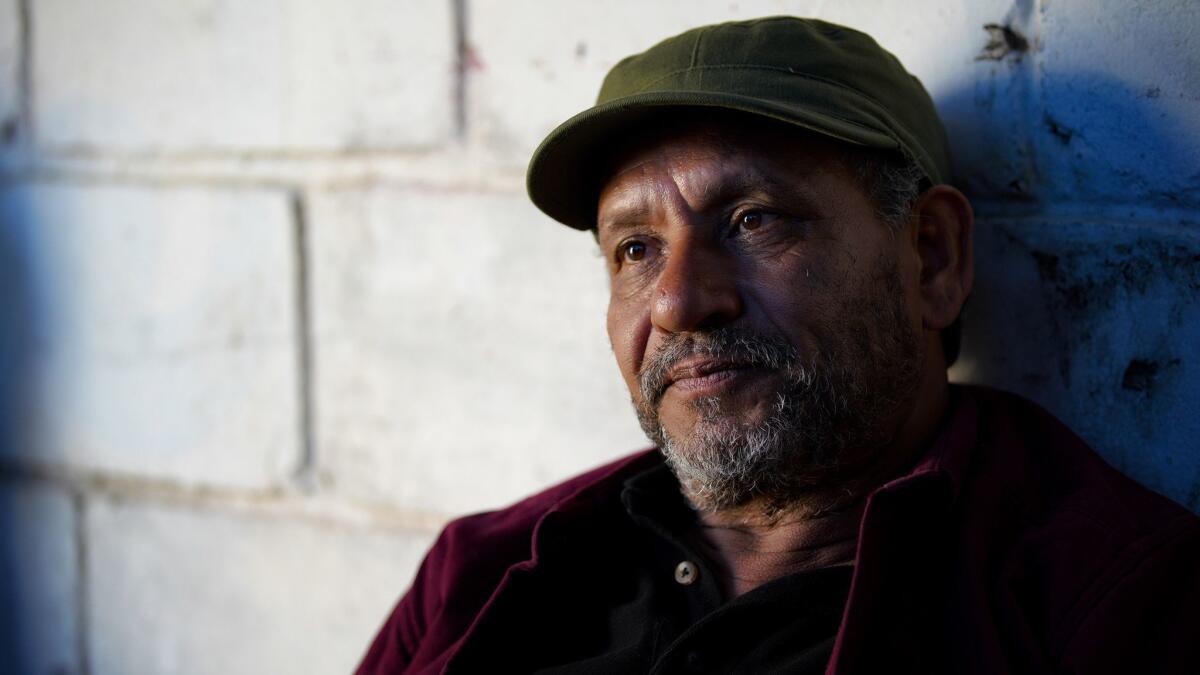In the 1980s, this Honduran sparked friction between the U.S. and Mexico. Now, he’s stirring migrants in Tijuana

Alfonso Guerrero Ulloa, the unofficial spokesperson of a group of Honduran migrants who caused an uproar by suggesting the U.S. pay $50,000 to each person who returns home, hasn’t set foot in Honduras in more than three decades.
He left his birthplace in 1987, after being accused in the planting of a bomb in a Chinese restaurant in Honduras that injured six U.S. soldiers. Guerrero contended that the charges were false — his accuser later admitted his statement implicating Guerrero had been coerced — and Mexico offered political asylum, despite U.S. government protests.
Guerrero, 54, has spent the last 31 years living a quiet life in Mexico City. Until recently, he earned a living selling bracelets, earrings and necklaces.
But it hasn’t amounted to much. Guerrero says he has $10 to his name and does not have a bank account.
His quiet life changed Nov. 4, when he joined a caravan of Central American migrants heading north to the United States. He joined the group in Cordoba, about 180 miles southeast of Mexico City.
Migrant groups march to U.S. consulate in Tijuana demanding reparations »
“It’s a joy to be able to serve my country again,” Guerrero said from the El Barretal migrant shelter in Tijuana. “Sleeping here in the cold, eating what everyone else is eating, brings me joy.”
Guerrero said he joined the caravan after seeing it on the news. He wanted to help and spread his political message opposing Honduran President Juan Orlando Hernandez.
As soon as he joined the caravan, Guerrero clashed with organizers who wanted to keep politics out of what they described as a humanitarian movement. But Guerrero persisted. He says a small group of migrants joined his cause, and the group slowly grew over time.
Guerrero sees the migrants’ flight out of Honduras as part of a larger movement. He says rampant crime, poverty and corruption are all linked to politics. In an interview, he repeatedly said the migrants’ goal is to “liberate Honduras.”
In 1987, Guerrero was linked to tension between the Mexican and U.S. governments after a bomb exploded in the China Palace near the largest U.S. military base in Honduras. Six U.S. soldiers and a Honduran civilian were injured.
The man who confessed to taking part in the bombing and who implicated Guerrero later said he had been tortured by the military into making a false confession, which brought renewed scrutiny of Honduras’ human rights record. Mexico called Guerrero a freedom fighter and granted him permanent asylum. The U.S. protested, calling him a terrorist.
About 10 months ago, Guerrero started an online petition asking the U.S. to exonerate him.
On Tuesday he led a group of 100 migrants to the U.S. Consulate in Tijuana asking President Trump to either let the migrants into the United States or oust Hernandez from office and pay each migrant $50,000 to go back to Honduras. He based that figure on what he considers reparations from the U.S. for its intervention in Central America.
“The United States is directly responsible for this humanitarian crisis,” he said. “Honduras is practically colonized by the United States.”
The group decided on that figure during a general assembly last week. It started when someone asked the group what it would take for people to turn around and go back.
Someone yelled that they’d leave for $10,000, and someone else shouted $20,000. People kept throwing out numbers: $50,000 and $60,000. Some said they wouldn’t turn around for any price. Eventually they settled on $50,000.
Guerrero sleeps in a concrete room inside El Barretal surrounded by a small group of supporters — all of them young men. Inside the room is a small stockpile of toilet paper, pads, water bottles and an extension cord where people charge phones.
Every couple of minutes, migrants poke their heads into the room and ask for supplies. Many call Guerrero by his nickname, Comandante, or commander.
Guerrero says he is not motivated by money and rejects accusations that he is using the migrant caravan for his own gain.
“If in the last 30 years I haven’t taken advantage of another movement, do you think I’ll do it now when we are fighting for the liberation of Honduras?” he asked. “For me, freedom and the well-being of my countrymen are more important than any amount of money.”
The group’s letter gave the U.S. Consulate a 72-hour deadline to respond.
Nobody in the migrant shelter has heard a response. But on Wednesday, the Department of Homeland Security criticized their proposal.
“In case you haven’t seen, some of the so-called ‘asylum seekers’ at our southern border are now demanding the United States pay them $50,000 to return to their home countries,” read a statement from Homeland Security Assistant Press Secretary Katie Waldman. “As we’ve said all along, based on historic data and open source reporting, the overwhelming majority of caravan members are not legitimate asylum-seekers — if they were they would seek refuge in the first safe country they entered.”
The statement added that being a member of the caravan does not give migrants special rights for entry into the United States.
On Wednesday, migrants had mixed reactions to the $50,000 demand. Many were unaware of it. Some supported it, and others thought it was absurd.
It’s unclear how many support Guerrero. About 100 marched with him to the U.S. Consulate on Tuesday, but there are nearly 3,000 migrants in the shelter. Guerrero says that thousands support the letter.
Lourdes Castillo, 50, of Honduras said the group doesn’t speak for all of the migrants, although she did agree with some of the demands. “I wouldn’t take the money, but I think it’s a good idea to get rid of Juan Orlando Hernandez,” she said.
Castillo plans to ask for asylum in the U.S. She says her husband repeatedly abused her back home. She reported him to the police six or seven times, but the beatings never stopped.
Others thought the demand would do more harm than good by painting the migrants in a negative light. “It sounds like extortion,” said Nery Pineda, 39. “But if they offered it, everyone here would accept the money.”
Solis and Fry write for the San Diego Union-Tribune.
More to Read
Start your day right
Sign up for Essential California for news, features and recommendations from the L.A. Times and beyond in your inbox six days a week.
You may occasionally receive promotional content from the Los Angeles Times.






